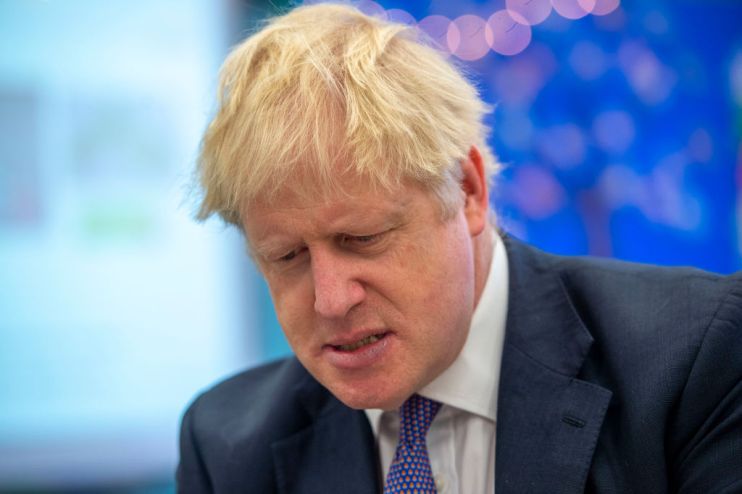Boris Johnson’s disastrous Huawei decision is an act of national self-harm

Powerful US Republican senator Tom Cotton of Arkansas put it best. Letting the state-sponsored Chinese technology firm Huawei build even a portion of Britain’s 5G network — as the Prime Minister nonsensically decided to do last week — is quite a bit like letting the KGB construct the British phone systems in the 1980s.
At the time, Margaret Thatcher’s government would have seen this for what it was — an act of madness. It is shocking, and highly counter-productive, that the newly-unbound Johnson government seems to have taken leave of its senses.
Let’s take a breath and actually think about this decision logically, first on its specific merits, then looking at how the choice affects Britain’s post-Brexit geopolitical strategy.
Start with the obvious (but seemingly forgotten) fact that Huawei is, like all major Chinese firms, not independent of the Chinese state.
That the senior leadership of the company has close personal ties to Beijing’s security institutions cannot be in doubt. Huawei’s chief executive Ren Zhengfei founded the company after serving in the People’s Liberation Army. The company’s chairwoman from 1999 to 2018, Sung Yafang, reportedly worked for state security before joining Huawei. To put it mildly, this is not the usual biography of leading commercial players in the west.
The fear is that China would be able to conduct wholesale surveillance in Britain (and be able to sabotage the country’s critical infrastructure) via Huawei kit in the future, by exploiting UK software vulnerabilities that it will become intimately aware of in helping construct the 5G network.
Huawei has consistently denied that it has ever been asked by the Chinese government to introduce secret “back doors” into its technology, and has even offered to sign a “no spying” agreement with the UK.
But of course they would say this. For there can be little doubt that — given the very nature of China’s state-dominated form of capitalism — Huawei would do as its masters in Beijing ordered, regardless of what they had previously agreed to.
Get the news as it happens by following City A.M. on Twitter.
The comical arrogance of the UK’s spymasters that this is all easily manageable frankly doesn’t pass the laugh test. Millions of lines of code are going to have to be perpetually monitored. Are we really saying that there is no one in the whole of China who might be able to slip into this ocean of data material undetected?
When confronted last year with precisely this dilemma, Australia — a country with even closer trading ties (as a percentage) to China than the UK — decided that the game was not worth the candle, banning Huawei from running its broadband network.
Likewise, the Prime Minister’s limp assurance to the Trump administration is risible. Lamely assuring President Trump that Johnson’s government will never again allow Britain to become reliant on Chinese technology is a classic case of trying to fence the horse in, after he has left the stable.
If the government’s decision makes no sense on its own merits, it is well nigh ruinous at a geostrategic level. Ideologically, Prime Minister Johnson is the first UK premier since Thatcher to espouse a general Anglosphere school of thought, believing that the UK’s strategic future lies not with the non-growth, declining EU, but instead in cultivating closer ties with its English-speaking former foreign dominions, such as the US, Canada, Australia, New Zealand, and India.
It is important to understand that in practical policy terms, there is one realm where the Anglosphere already fully exists — that of intelligence sharing. The “Five Eyes” (the US, UK, Canada, Australia, and New Zealand) have for many years shared open-source intelligence, trusting each other to an extraordinary degree, based on common historical, cultural, and linguistic ties.
It is clear — and entirely understandable from the American point of view — that involving Huawei in the UK’s 5G network is a dagger pointed at the heart of continued Anglosphere intelligence sharing, as Huawei infiltration could be a back door jeopardising this essential cooperative.
Ahead of the Huawei decision, the Americans flatly told British ministers that using Chinese technology in UK 5G networks would put transatlantic intelligence sharing at great risk. Following the government’s act of self-harm, senator Cotton called for an immediate review of intelligence sharing with London, which if it were limited in any way would have the gravest of consequences for the UK.
Johnson’s Huawei decision amounts to a crucial early signal of how closely the UK is strategically committed to its heretofore promising Anglosphere future. Judging by the government’s nonsensical choice, Britain is in danger of bungling its decisive geostrategic turn at its inception.
Sign up to City A.M.’s Midday Update newsletter, delivered to your inbox every lunchtime
Main image credit: Getty